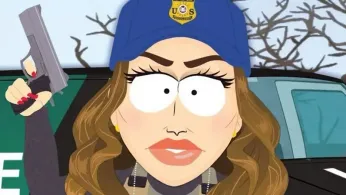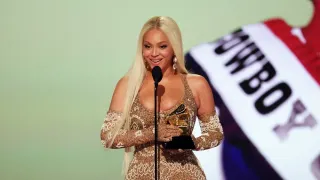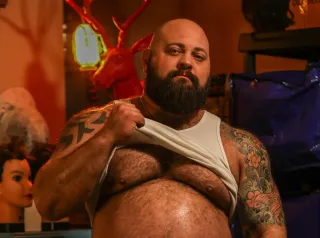
3 hours ago
'South Park' Takes Aim at Kristi Noem
READ TIME: 3 MIN.
In its most recent episode, the long-running animated series South Park set its comedic sights on a real-world controversy involving South Dakota Governor Kristi Noem. Known for its fearless approach to current events and public figures, South Park did not hold back, depicting Noem in an unflattering light over two highly publicized scandals: her recent admission of killing a puppy and widespread rumors regarding her use of Botox and plastic surgery .
The episode’s plot centers on a caricatured version of Noem, whom the show portrays with a melting face as a result of what it implies to be excessive cosmetic procedures. The animated governor is also depicted grappling with public outrage after admitting she had killed a family puppy—a story that drew significant national attention when it first surfaced earlier this year .
Governor Kristi Noem made headlines in the spring of 2025 when she publicly acknowledged in her memoir that she had killed a family dog she described as “untrainable.” The admission prompted a wave of criticism from animal rights advocates and the general public, sparking a heated debate about her judgment and compassion . The controversy further intensified as social media users, including many within the LGBTQ+ community, drew connections between Noem’s actions and broader questions of ethical leadership and empathy.
In the weeks following the memoir’s release, Noem faced additional scrutiny over her appearance, with some critics alleging that she had undergone significant cosmetic procedures. These rumors quickly became fodder for late-night comedians and online commentators, setting the stage for South Park’s satirical treatment .
outh Park’s episode has resonated with LGBTQ+ viewers in distinct ways. The show’s willingness to confront powerful figures and expose hypocrisy often aligns with queer audiences’ calls for greater transparency and accountability in public life. Additionally, the episode’s lampooning of Botox culture and beauty standards invites reflection on how society—and especially queer communities—navigate issues of body image, self-expression, and authenticity.
While South Park is infamous for its irreverence and sometimes controversial humor, many LGBTQ+ viewers see value in the show’s critique of politicians who wield power without regard for marginalized groups. Noem’s political record, which includes support for anti-transgender legislation in South Dakota, has made her a divisive figure within the queer community . For some, the episode’s unflinching satire offers a form of catharsis—a way to challenge leaders who have enacted policies detrimental to LGBTQ+ people and other vulnerable populations.
The episode’s visual portrayal of Noem—with exaggerated melting facial features—serves as a pointed commentary on public pressures surrounding appearance, particularly for women in politics. This aspect of the episode has opened up conversations about how beauty standards intersect with power, gender, and media scrutiny. For many queer viewers, who themselves contend with societal expectations around appearance and gender expression, the episode’s satire may feel both familiar and fraught .
However, some advocates caution that mocking politicians for their looks—even as satire—can perpetuate harmful stereotypes and detract from substantive critiques of their policies. LGBTQ+ commentators have emphasized the importance of focusing on leaders’ records and actions, rather than relying solely on appearance-based humor .
South Park’s approach to the Noem controversy exemplifies the unique role that political satire plays in American culture. The show’s irreverent tone and willingness to “punch up” at those in power have made it a venue for social commentary that resonates across diverse audiences. For LGBTQ+ viewers, the episode may serve as a reminder that comedy can be both a tool for critique and a mirror reflecting society’s contradictions.
While reactions to the episode have been mixed, with some viewers praising its boldness and others questioning its methods, the conversation it has sparked—about accountability, beauty standards, and the representation of public figures—continues to unfold. As the queer community and its allies navigate these discussions, South Park’s latest satire stands as a testament to the enduring power of humor to provoke, challenge, and inspire dialogue .






